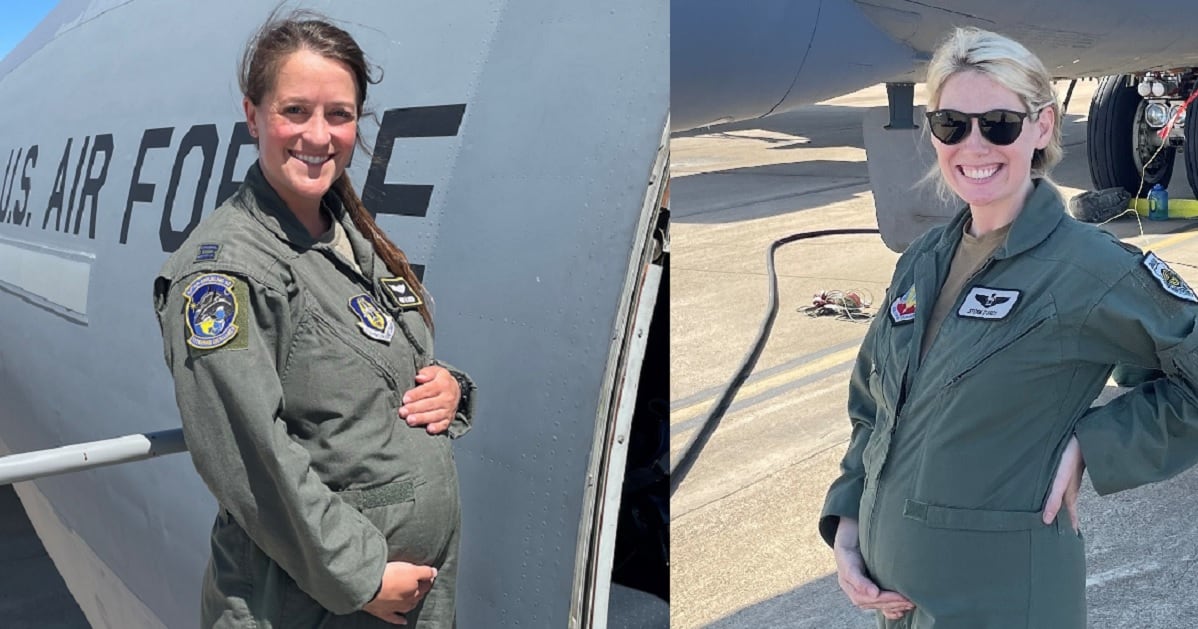A coalition of female military veterans in Congress is calling on Defense Secretary Pete Hegseth to answer for an abrupt reversal of a policy change that allowed female Air Force pilots the chance to fly for more of their pregnancy, calling the move “purely political” and warning that it threatened combat capability and military readiness in the already undermanned pilot community.
In a letter sent Friday, Rep. Chrissy Houlahan, D-Penn., joined three veteran co-signers in asking Hegseth and acting Air Force Secretary Gary Ashworth to explain the Air Force’s reasoning for the policy change — published April 1 with little fanfare — which bars female pilots from flying at all in the first 12 weeks of pregnancy and bars aircrew from flying in “high-performance aircraft” and planes with ejection seats at any point during a pregnancy.
Others who signed the letter include Sen. Tammy Duckworth, D-Ill; Rep. Mikie Sherill, D-N.J., and Maggie Goodlander, D-N.H., all of whom served as military officers prior to their time in Congress.
The policy update does increase the pregnancy flying window by four weeks, allowing flights between weeks 28 to 32, which had previously been prohibited. But it also makes it much more difficult to get a waiver for the new restrictions, raising that authority from the installation flight surgeon to the major command level.
RELATED

“Reversing the [flying-while-pregnant] policy would reinstate the penalties that Air Force aircrew and aviators faced before the policy’s 2019 revisions. In 2018, over 400 Air Force aircrew members were pregnant, and as a result, grounded from flying aircraft,” the lawmakers wrote. “Aircrew members grounded for the duration or part of their pregnancy faced the loss of long-term landing, instrument, and other currency. Moreover, they faced the possibility of being ineligible to fly for least twelve (12) months, including postpartum.”
The length of time away from their aircraft, the lawmakers wrote, required a costly and resource-intensive flight requalification process.
“The result was a loss of combat capability and readiness due to reduced aircrew capacity, avoidable costs from multi-million-dollar requalification training, and negative effects on the retention and morale of servicewomen aviators,” they wrote.
The letter calls on the Air Force and Pentagon to cite any new medical data that led to the reversal and provide evidence of risk to justify total restrictions for flight in ejection-seat aircraft. It also asks for data related to waivers granted for pregnant aircrew since 2019.
“As the U.S. Secretary of Defense, you have consistently emphasized the importance of combat readiness and military lethality in ensuring national security. More recently, during a Pentagon town hall, you highlighted the urgency of maintaining military readiness in the face of global threats,” the letter-writers said, addressing Hegseth.
“Additionally, you have insisted that the military be a merit-based institution, free from special carve outs and rules. As members of the House of Armed Services Committee, we believe that this change in policy critically hinders our nation’s combat readiness and that a purely political bias jeopardizes both military readiness and women’s health.”

The Air Force has provided little information about how the policy change came about. In response to questions from Military Times, a spokesperson said the Air Force Surgeon General provided a recommendation to the Air Force chief of staff, but could not say when the recommendation was made or how long the change had been in planning. There were no medical incidents involving pregnant aviators on duty that prompted the policy change, the spokesperson said.
Hegseth, the official said, did not initiate or direct the change.
In an interview Tuesday, Houlahan told Military Times that, while it wasn’t clear what spurred the change, “it’s hard not to make the connection” between the reversal and the installment of Hegseth, who, in concert with the Donald Trump White House, has fired a number of high-profile female officers and directed the dissolution of advisory teams including those advocating for women in service.
On Thursday, Houlahan joined Sherill and Goodlander in asking Hegseth for answers on the elimination of the Air Force’s Women’s Initiative Team, a highly regarded group of active-duty policy advisors.
“It’s a very unfortunate political decision, because I think it penalizes women who are aviators, women pilots who I believe have their own autonomy and ability to make decisions about what they care about, their bodies and their careers,” Houlahan, a former Air Force captain, said of the pregnancy policy reversal. “And I think here, as I can understand, there’s no medical change or medical evidence … that this is a good policy change, and so I can only attribute it to be political and punitive.”
Jessica Ruttenber, a retired Air Force KC-135 refueler and C-21 transport pilot who had her three children while in flying billets and continued to fly as long as she was able with each pregnancy, said she nonetheless saw her performance reviews trend downward after she became a mother. When she saw the same phenomenon happen to women who came after her, she got angry, she said.
Ruttenber began writing data-driven papers using available medical and flight data to advocate for women to have more autonomy over their careers while pregnant, submitting her research to help inform policy and reduce unnecessary restrictions. Her work was behind a 2022 Air Force policy change that rolled back flight restrictions enacted in 2019, allowing women to apply for waivers to fly in the first and third trimesters and giving broad permission to fly in the second trimester in non-ejection seat aircraft.
The most recent reversal, Ruttenber said, represented “the years of work we did on this … wiped away.”
Ruttenber said focusing on pregnancy risk in the cockpit ignores higher-risk activities that women continue to do routinely, such as driving. Since the 1970s, she said, Federal Aviation Administration and Air Force safety records show zero incidents of mishap related to pregnancy.
“We feel this isn’t science-based,” she said. “We feel this is misogyny and taking advantage of the political climate.”
Danielle Willis, who flew F-16s and T-38 trainers for the Air Force and served as vice director of operations at U.S. Northern Command and North American Aerospace Defense Command (NORAD) before retiring as a colonel in February, said that, in accordance with legacy policies, she’d been grounded from flight for the duration of each of her two pregnancies and the recovery that followed.
“And so, when the policy came out in 2022, I was really heartened to see that we had done that,” said Willis, who would later serve as an advisor for a women’s barrier elimination team within Air Combat Command. She said she was disappointed to see an “out of the blue” reversal decision that was presented without new data or information to support it.
“I’m sure there were people who [were] uncomfortable with women flying while pregnant,” Willis said. “But unless you are the aviator, part of the medical team or the commander with the waiver authority, then they’re kind of outside that decision sphere.”





